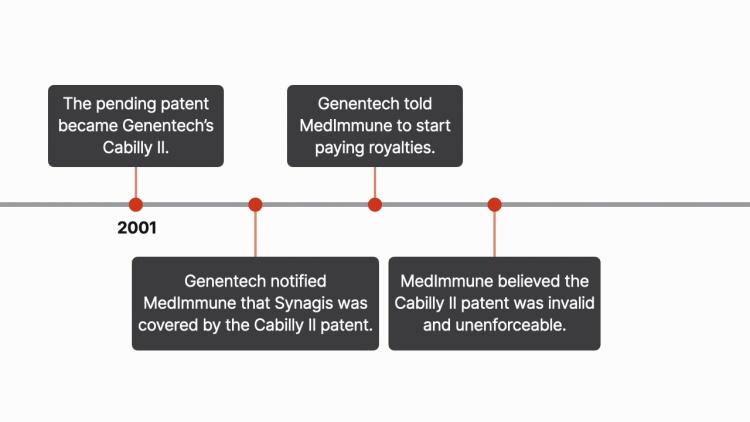MedImmune, Inc. v. Genentech, Inc.
United States Supreme Court
549 U.S. 118 (2007)
- Written by Craig Conway, LLM
Facts
Under the terms of a patent license agreement, Genentech, Inc. (“Genentech”) (defendant) agreed to license an existing patent and a then-pending patent to MedImmune, Inc. (“MedImmune”) (plaintiff) in exchange for royalties paid by MedImmune on the existing patent. MedImmune began manufacturing a drug used to prevent respiratory tract disease in infants and young children called Synagis. Genentech’s pending patent thereafter was approved, called Cabilly II. Genentech argued that Synagis was covered by Cabilly II and demanded that MedImmune pay royalties. MedImmune did not believe it should be required to pay royalties on the basis that Cabilly II was invalid and unenforceable, but did not want to risk a patent infringement suit and possible payment of treble damages. Thus, MedImmune paid royalties under protest and, at the same time, filed a declaratory judgment suit in district court. The court granted Genentech’s motion to dismiss the claims on the ground that the “cases” and “controversies” requirement of Article III of the U.S. Constitution, and U.S. Supreme Court precedent held a license agreement “obliterates any reasonable apprehension” that the licensee will be sued for infringement. Gen-Probe Inc. v. Vysis, Inc., 359 F.3d 1376, 1381 (2004). The U.S. Court of Appeals for the Federal Circuit affirmed and MedImmune’s petition for certiorari to the U.S. Supreme Court which was granted.
Rule of Law
Issue
Holding and Reasoning (Scalia, J.)
What to do next…
Here's why 911,000 law students have relied on our case briefs:
- Written by law professors and practitioners, not other law students. 47,100 briefs, keyed to 997 casebooks. Top-notch customer support.
- The right amount of information, includes the facts, issues, rule of law, holding and reasoning, and any concurrences and dissents.
- Access in your classes, works on your mobile and tablet. Massive library of related video lessons and high quality multiple-choice questions.
- Easy to use, uniform format for every case brief. Written in plain English, not in legalese. Our briefs summarize and simplify; they don’t just repeat the court’s language.





